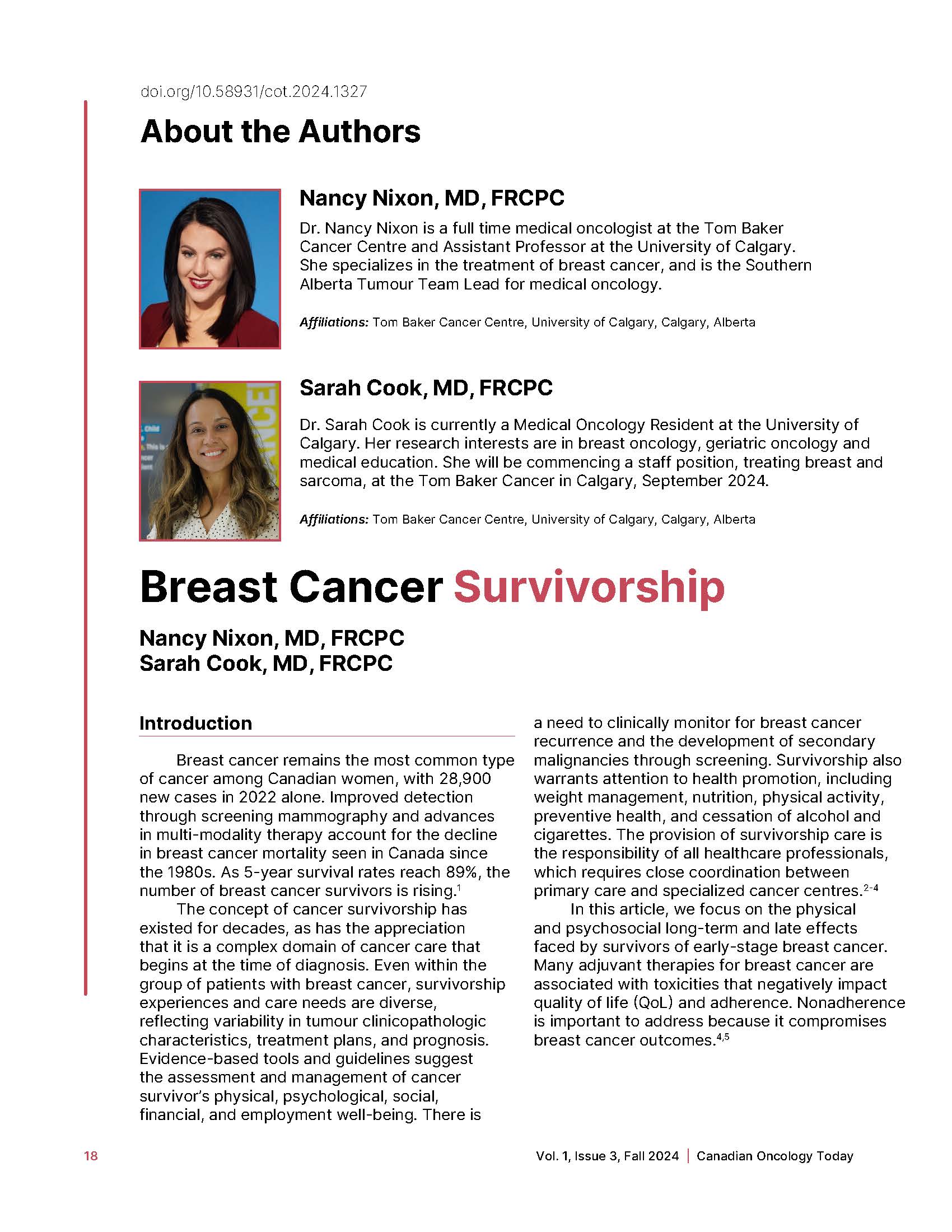Breast Cancer Survivorship
DOI:
https://doi.org/10.58931/cot.2024.1327Abstract
Breast cancer remains the most common type of cancer among Canadian women, with 28,900 new cases in 2022 alone. Improved detection through screening mammography and advances in multi-modality therapy account for the decline in breast cancer mortality seen in Canada since the 1980s. As 5-year survival rates reach 89%, the number of breast cancer survivors is rising.
The concept of cancer survivorship has existed for decades, as has the appreciation that it is a complex domain of cancer care that begins at the time of diagnosis. Even within the group of patients with breast cancer, survivorship experiences and care needs are diverse, reflecting variability in tumour clinicopathologic characteristics, treatment plans, and prognosis. Evidence-based tools and guidelines suggest the assessment and management of cancer survivor’s physical, psychological, social, financial, and employment well-being. There is a need to clinically monitor for breast cancer recurrence and the development of secondary malignancies through screening. Survivorship also warrants attention to health promotion, including weight management, nutrition, physical activity, preventive health, and cessation of alcohol and cigarettes. The provision of survivorship care is the responsibility of all healthcare professionals, which requires close coordination between primary care and specialized cancer centres.
In this article, we focus on the physical and psychosocial long-term and late effects faced by survivors of early-stage breast cancer. Many adjuvant therapies for breast cancer are associated with toxicities that negatively impact quality of life (QoL) and adherence. Nonadherence is important to address because it compromises breast cancer outcomes.
References
Brenner DR, Poirier A, Woods RR, Ellison LF, Billette JM, Demers AA, et al. Projected estimates of cancer in Canada in 2022. Can Med Assoc J. 2022 May 2;194(17):E601–7.
Runowicz CD, Leach CR, Henry NL, Henry KS, Mackey HT, Cowens-Alvarado RL, et al. American Cancer Society/American Society of Clinical Oncology Breast Cancer Survivorship Care Guideline. Journal of Clinical Oncology. 2016 Feb 20;34(6):611–35.
Wilkinson AN, Boutet CE. Breast Cancer Survivorship Tool: Facilitating breast cancer survivorship care for family physicians and patients. Can Fam Physician. 2020 May;66(5):321–6.
Vaz-Luis I, Masiero M, Cavaletti G, Cervantes A, Chlebowski RT, Curigliano G, et al. ESMO Expert Consensus Statements on Cancer Survivorship: promoting high-quality survivorship care and research in Europe. Annals of Oncology. 2022 Nov;33(11):1119–33.
Pistilli B, Paci A, Ferreira AR, Di Meglio A, Poinsignon V, Bardet A, et al. Serum Detection of Nonadherence to Adjuvant Tamoxifen and Breast Cancer Recurrence Risk. Journal of Clinical Oncology. 2020 Aug 20;38(24):2762–72.
PDQ Adult Treatment Editorial Board. PDQ Cancer Information Summaries. 2023. Breast Cancer Treatment (PDQ®): Health Professional Version.
Dijkshoorn ABC, van Stralen HE, Sloots M, Schagen SB, Visser‐Meily JMA, Schepers VPM. Prevalence of cognitive impairment and change in patients with breast cancer: A systematic review of longitudinal studies. Psychooncology. 2021 May 2;30(5):635–48.
Whittaker AL, George RP, O’Malley L. Prevalence of cognitive impairment following chemotherapy treatment for breast cancer: a systematic review and meta-analysis. Sci Rep. 2022 Feb 8;12(1):2135.
Carreira H, Williams R, Müller M, Harewood R, Stanway S, Bhaskaran K. Associations Between Breast Cancer Survivorship and Adverse Mental Health Outcomes: A Systematic Review. JNCI: Journal of the National Cancer Institute. 2018 Dec 1;110(12):1311–27.
Lambertini M, Arecco L, Woodard TL, Messelt A, Rojas KE. Advances in the Management of Menopausal Symptoms, Fertility Preservation, and Bone Health for Women With Breast Cancer on Endocrine Therapy. American Society of Clinical Oncology Educational Book. 2023 May;(43).
Waqas K, Lima Ferreira J, Tsourdi E, Body JJ, Hadji P, Zillikens MC. Updated guidance on the management of cancer treatment-induced bone loss (CTIBL) in pre- and postmenopausal women with early-stage breast cancer. J Bone Oncol. 2021 Jun;28:100355.
Papaioannou A, Morin S, Cheung AM, Atkinson S, Brown JP, Feldman S, et al. 2010 clinical practice guidelines for the diagnosis and management of osteoporosis in Canada: summary. Can Med Assoc J. 2010 Nov 23;182(17):1864–73.
Oktay K, Harvey BE, Loren AW. Fertility Preservation in Patients With Cancer: ASCO Clinical Practice Guideline Update Summary. J Oncol Pract. 2018 Jun;14(6):381–5.
Arecco L, Blondeaux E, Bruzzone M, Ceppi M, Latocca MM, Marrocco C, et al. Safety of fertility preservation techniques before and after anticancer treatments in young women with breast cancer: a systematic review and meta-analysis. Human Reproduction. 2022 May 3;37(5):954–68.
Pacheco F, Oktay K. Current Success and Efficiency of Autologous Ovarian Transplantation: A Meta-Analysis. Reproductive Sciences. 2017 Aug 1;24(8):1111–20.
Moore HCF, Unger JM, Phillips KA, Boyle F, Hitre E, Porter D, et al. Goserelin for Ovarian Protection during Breast-Cancer Adjuvant Chemotherapy. New England Journal of Medicine. 2015 Mar 5;372(10):923–32.
Perachino M, Poggio F, Arecco L, Blondeaux E, Spinaci S, Marrocco C, et al. Update on Pregnancy Following Breast Cancer Diagnosis and Treatment. The Cancer Journal. 2022 May;28(3):176–82.
Partridge AH, Niman SM, Ruggeri M, Peccatori FA, Azim HA, Colleoni M, et al. Interrupting Endocrine Therapy to Attempt Pregnancy after Breast Cancer. New England Journal of Medicine. 2023 May 4;388(18):1645–56.
Cold S, Cold F, Jensen MB, Cronin-Fenton D, Christiansen P, Ejlertsen B. Systemic or Vaginal Hormone Therapy After Early Breast Cancer: A Danish Observational Cohort Study. JNCI: Journal of the National Cancer Institute. 2022 Oct 6;114(10):1347–54.
Early Breast Cancer Trialists’ Collaborative Group (EBCTCG). Relevance of breast cancer hormone receptors and other factors to the efficacy of adjuvant tamoxifen: patient-level meta-analysis of randomised trials. The Lancet. 2011 Aug;378(9793):771–84.
Yussof I, Mohd Tahir NA, Hatah E, Mohamed Shah N. Factors influencing five-year adherence to adjuvant endocrine therapy in breast cancer patients: A systematic review. The Breast. 2022 Apr;62:22–35.
Francis PA, Pagani O, Fleming GF, Walley BA, Colleoni M, Láng I, et al. Tailoring Adjuvant Endocrine Therapy for Premenopausal Breast Cancer. New England Journal of Medicine. 2018 Jul 12;379(2):122–37.
Johnston SRD, Toi M, O’Shaughnessy J, Rastogi P, Campone M, Neven P, et al. Abemaciclib plus endocrine therapy for hormone receptor-positive, HER2-negative, node-positive, high-risk early breast cancer (monarchE): results from a preplanned interim analysis of a randomised, open-label, phase 3 trial. Lancet Oncol. 2023 Jan;24(1):77–90.

Published
How to Cite
Issue
Section
License
Copyright (c) 2024 Canadian Oncology Today

This work is licensed under a Creative Commons Attribution-NonCommercial-NoDerivatives 4.0 International License.
